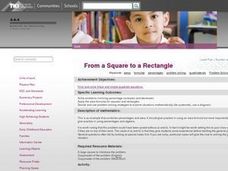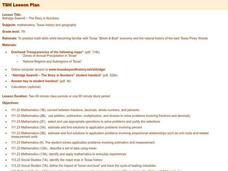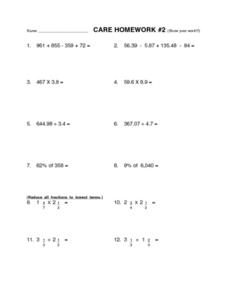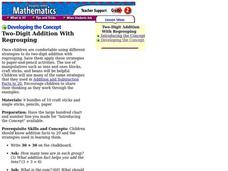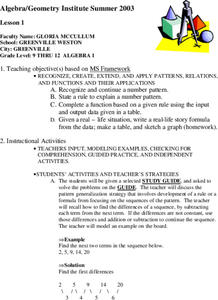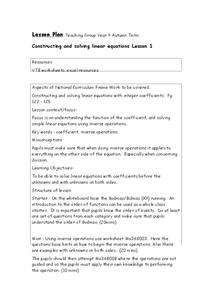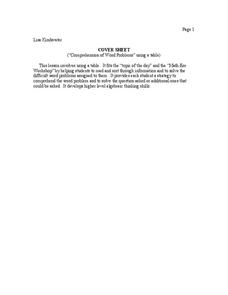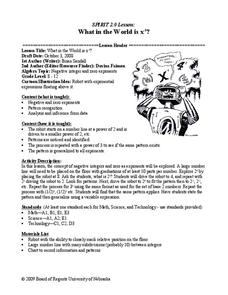Curated OER
Identify and Graph Linear Equations
Young scholars investigate linear functions. In this mathematics lesson, students plot points onto a graph by solving the equations y=x and y=mx+b by being given numbers for x and solving for y.
Curated OER
Building Understanding of Rate of Change/Slopes Using Alice
Students explore slope as a rate of change. In this eighth grade mathematics activity, students investigate real-world problems to determine rate of change and transform it into a linear representation, thus determining slope. Students...
Curated OER
Shaking Up Ice Cream
Upper graders use a variety of tools to measure liquid and solid ingredients in an ice cream making recipe. Following written and oral directions and accurately timing themselves forms the basis of this lesson.
Curated OER
Using the Web to Explore Shapes
Third graders research the Internet to locate geometric designs in familiar buildings. They review shapes, solids, angles and symmetry as they research websites of familiar buildings in Louisville. They record the information they see...
Curated OER
Property Lists for Quadrilaterals
Young scholars establish classifications of shapes by various properties (angles, sides, etc.). They introduce the important properties of common shapes. Students develop an awareness of the wide variety of ways the 2-D shapes can be alike.
Curated OER
Binomial Expansions
In this algebra worksheet, students factor and expand equations using binomial expansion. They identify coefficients of different terms. There are forty-four questions with an answer key.
Pennsylvania Department of Education
Links Away: Looking Back and Moving Forward
Students explore fact families. In this math lesson, students use links to model a fact family. Students solve addition and subtraction problems.
Curated OER
From a Square to a Rectangle
Eighth graders solve problems involving percentage increases and decreases. Using given percentages, 8th graders transform a square into a rectangle. They apply the area formulas for squares and rectangles.Students observe the percent...
Curated OER
Aldridge Sawmill - The Story in Numbers
Seventh graders practice math skills while becoming familiar with Texas' "Boom & Bust" economy and the natural history of the east Texas Piney Woods. They utilize worksheets and websites imbedded in this plan.
Curated OER
The Old Chicken Run Problem
Sixth graders apply problem solving strategies to work with a real life situation in which they need to determine the area. They determine the area of chicken runs that are rectangular in shape when give a partial perimeter.
Curated OER
Using the Distributive Laws and Factoring
In this math worksheet, students solve the problems for the algebraic expressions using the skills of factoring and applying the distributive law.
Curated OER
Island Hopping
Learners utilize a variety of math skills to explore the Turks and Caicos Islands, the British Territory to which South Caicos belongs. They select and apply quantitative data to support their recommendations for future investment and...
Curated OER
Solving Problems Using Proportions
In this math worksheet, students solve the problems that are in word form in order to find the proper type of proportion for the solution.
Curated OER
Addition, Subtraction, Multiplication and Division of Real Numbers
In this math worksheet, students apply themselves to solve the problems with fractions and all the operations of real numbers.
Curated OER
Keynesian Economics and Fiscal Policy
Students examine and analyze the characteristic problem of each phase of the business cycle. Students articulate the appropriate choices for each of the problems described. Students apply the writing process to write an essay.
Curated OER
Care Homework #2
In this Care Homework worksheet, students solve a variety of multiple digit addition, subtraction, multiplication, and division problems that include fractions, decimals, and percentages. They demonstrate knowledge of geometric formulas...
Curated OER
Battling Bullies
Students identify aspects of a conflict situation through a story. They engage in problem solving or identification of an aspect of bullying. Applying their knowledge of bullying, they create scenarios that reflect their methods of...
Curated OER
Two-Digit Addition With Regrouping
Second graders practice two-digit addition with regrouping. In this addition lesson, 2nd graders use craft sticks to solve two-digit regrouping problems. Students solve problems on the chalkboard.
Curated OER
Patterns, Relations, and Functions
Students investigate the patterns of different data sets of numbers. They use critical thinking skills in order to find the missing numbers in any given set. This instructional activity helps to develop the skill of number sense.
Curated OER
The Big Bang Theory
Learners explore the Big Bang Theory and discover how it can be used to explain the origin of the universe. For this Big Bang Theory lesson, students use a balloon with colored paper inside, blow it up and pop it, group the colored...
Curated OER
Constructing and Solving Linear Equations
Learners construct and solve linear equations. For this algebra lesson, students solve equations and graph lines using the slope. They identify the different parts of an equation including the leading coefficient.
Curated OER
"Comprehension of Word Problems" Using a Table
Sixth graders practice solving math problems by utilizing a data table. In this number sense lesson, 6th graders create a table using the numerical information about a fictitious farm's inventory. Students complete the empty segments by...
Curated OER
Negative Exponents
Students solve negative exponential functions. In this algebra lesson, students define the properties for rewriting functions with negative and zero exponents. They use a robot to create a visual of what is happening to the negative...
Curated OER
Identify Shapes and Matching Parts
Students identify real world objects as shapes they have learned. In this 3-D shapes worksheet, students identify shapes such as a cube for a box, a sphere for a globe, and a cylinder for a soup can.







